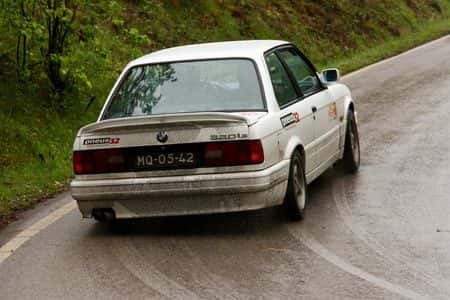Teenager paralyzed after anti-lock braking system fails
Updated on
This auto service case involves a man who bought a 1986 sports car for his sixteen-year-old son. The car had an anti-lock braking system. The teenager had read about the anti-lock braking system and believed that the system would not “lock up” under emergency braking situations. After having put 27,000 miles on the car, the teenager met with some friends one night and planned to eat at a local restaurant. The teenager had to drive along an old country road that had long straight-aways mixed with some curves. The teenager was driving at speeds up to 95 or 100 miles per hour before he came to an extremely sharp curve in the road. When he reached the curve, he decelerated down to about 20 miles per hour and drove safely through the curve. He then accelerated to 85 miles per hour on a mile-long straight-away. As he approached another curve with a speed limit of 45mph, he slowed down to about 65-70 mph and tried to go through the curve. He decided to slow down even more because it was nighttime. When he applied the brakes with medium force, the brakes did not respond. He applied the brakes hard and he lost control of the car, which began to skid. The rear of the car swung around clockwise, sliding sideways off the road. The car went through a fence and underbrush. The car flipped twice and dropped off the high bluff and landed on its roof in a sand bar near a river. The teenager suffered a broken back as the result of the accident. The teenager was permanently paralyzed from the waist down.
Question(s) For Expert Witness
What could cause the anti-lock braking system in an older model sports car to fail and cause an auto accident?
Expert Witness Response
![]() There were probably two distinct causes of the accident in this case. First, the teenager might have erroneously applied his brakes after the car had begun negotiating the curve so that the added braking load on the tires, combined with the side load from centrifugal force against the tires in the curve, started the car into an out-of-control sideways slide. Second, the braking during the last 300 to 150 feet before the car left the asphalt may not have locked the wheels, and this may have prevented rotation through the skid. The manufacturers of some older sports cars with anti-lock braking systems did a great deal of advertising to the public about the benefits of the anti-lock braking system. The manufacturers stated that the system was specifically designed to monitor all four wheels and automatically “pump” the brakes on the car when one or more wheels begin to slide. This was supposed to prevent brake-induced wheel lock-up and shorten stopping distances on most surfaces. The problem with the anti-lock braking system on some older sports cars is that the system has been known to fail if an inexperienced driver tries to negotiate a curve going more than 60 mph. This has led some drivers, like the one in this case, to try to speed through a curve (at speeds of up to 140 miles per hour) and end up slipping or skidding off the road when the system fails. Because the system has been known to fail at high speeds, the manufacturers in this case should have provided a warning that stated that the anti-lock braking system might not be able to work if a driver immediately applied the brakes in the middle of a high radius curve at a very high speed.
There were probably two distinct causes of the accident in this case. First, the teenager might have erroneously applied his brakes after the car had begun negotiating the curve so that the added braking load on the tires, combined with the side load from centrifugal force against the tires in the curve, started the car into an out-of-control sideways slide. Second, the braking during the last 300 to 150 feet before the car left the asphalt may not have locked the wheels, and this may have prevented rotation through the skid. The manufacturers of some older sports cars with anti-lock braking systems did a great deal of advertising to the public about the benefits of the anti-lock braking system. The manufacturers stated that the system was specifically designed to monitor all four wheels and automatically “pump” the brakes on the car when one or more wheels begin to slide. This was supposed to prevent brake-induced wheel lock-up and shorten stopping distances on most surfaces. The problem with the anti-lock braking system on some older sports cars is that the system has been known to fail if an inexperienced driver tries to negotiate a curve going more than 60 mph. This has led some drivers, like the one in this case, to try to speed through a curve (at speeds of up to 140 miles per hour) and end up slipping or skidding off the road when the system fails. Because the system has been known to fail at high speeds, the manufacturers in this case should have provided a warning that stated that the anti-lock braking system might not be able to work if a driver immediately applied the brakes in the middle of a high radius curve at a very high speed.
Subscribe to our newsletter
Join our newsletter to stay up to date on legal news, insights and product updates from Expert Institute.
Sign up nowFind an expert witness near you
What State is your case in?
Subscribe to our newsletter
Join our newsletter to stay up to date on legal news, insights and product updates from Expert Institute.


